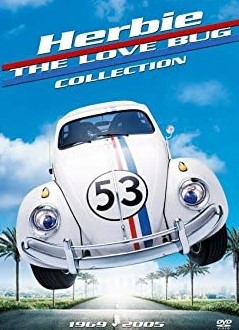| Herbie | |
|---|---|
 Official home video release, boxset collection artwork. The design is based on Herbie: Fully Loaded | |
| Created by | Bill Walsh Don DaGradi |
| Original work | The Love Bug (1968) |
| Owner | The Walt Disney Company |
| Years | 1968–2005 |
| Based on | "Car, Boy, Girl" by Gordon Buford |
The Herbie franchise consists of American sports adventure comedy theatrical feature films, one television film, a television series, and other multimedia releases.[1] The overall story centers around the titular Herbie, a sentient anthropomorphic 1963 Volkswagen Beetle with a mind of his own and capable of driving himself. The vehicle is oftentimes a legitimate contender, though the underdog contestant in competitive races, but to a greater degree assists his human owners in bettering their lives.
The first film, notable for being the final live-action film produced under the supervision by Walt Disney prior to his death, was released in 1969. Based on a story titled "Car, Boy, Girl", the feature proved to be a critical and financial success for Walt Disney Productions. Upon its release, the movie was the second-highest-grossing film for the company, second only to Mary Poppins (1964). Its performance placed it fourth highest on box office returns, and spawned a franchise.[2][3] Each of the subsequent releases were successes in their own right, but none received as much universal praise as the original.
The second film was met with generally positive reception from critics.[4][5][6] The third film was met with mixed reception,[7] while the fourth film was poorly received and is often classified as the weakest Herbie film.[8][9] The television series was panned by critics, resulting in a cancellation following five episodes, with reviews calling it "domesticated", "mild", and "boring".[10] The fifth film was met with negative reviews, citing its inferiority to the original.[citation needed] The sixth film was met with mixed reception, and garnered the highest box-office returns out of all of the installments. Though the film was criticized for various aspects including the plot, it was seen as a return to form for the franchise.[11][12]
- ^ Gross, Michael Joseph (March 13, 2005). "The Second Time as Comedy". The New York Times. Retrieved September 19, 2020.
- ^ MeTV Staff (June 8, 2016). "11 lovable facts about Herbie the Love Bug". MeTV 4.2 Utah. Retrieved September 17, 2020.
- ^ IMDb (March 13, 2020). "Herbie 'The Love Bug' Behind-The-Scenes And How A Volkswagen Beetle Won The World's Heart". Groovy History. Retrieved September 17, 2020.
- ^ Canby, Vincent (June 7, 1974). "The Screen: ' Herbie' Rides Again to Defend Landmarks". The New York Times. 23.
- ^ Siskel, Gene (July 17, 1974). "Disney's 'Herbie' Rides Again'". Chicago Tribune. Section 2, p. 5.
- ^ Cite error: The named reference
Rides Again_RTwas invoked but never defined (see the help page). - ^ "Herbie Goes to Monte Carlo (1977)". Rotten Tomatoes. Fandango Media. Retrieved April 4, 2020.
- ^ Maslin, Janet (September 12, 1980). "Movie Review - Herbie Goes Bananas - DISNEY RIDES AGAIN - NYTimes.com". Movies.nytimes.com. Retrieved September 9, 2013.
- ^ Patton, Phil (2002). Bug: The Strange Mutations of the World's Most Famous Automobile. New York: Simon & Schuster. pp. 110–111. ISBN 0-7432-0242-2.
- ^ Bibbiani, William; Seibold, Witney (February 28, 2018). "Canceled Too Soon #88 – Herbie, The Love Bug (1982)". Gone Too Soon. Retrieved September 18, 2020.
- ^ Thomas, William (January 1, 2000). "Herbie: Fully Loaded Review". Empire Online. Retrieved September 18, 2020.
- ^ Ebert, Roger (June 21, 2005). "How sentient is NASCAR Herbie?". RogerEbert.com. Retrieved September 17, 2020.